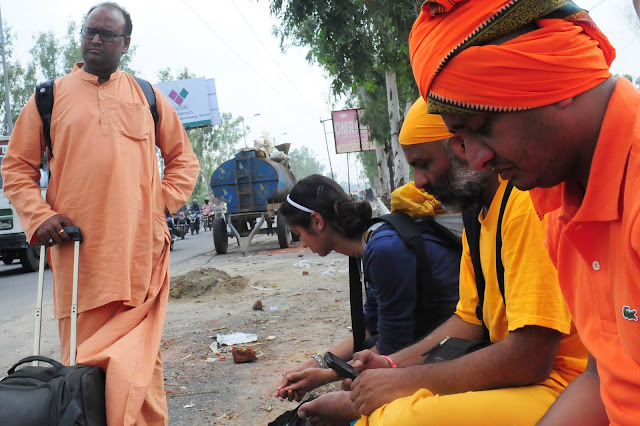शत्रौ मित्रे पुत्रे बन्धौ मा कुरु
यत्नं विग्रहसन्धौ ।
सर्वस्मिन्नपि पश्यात्मानं सर्वत्रोत्सृज भेदाज्ञानम् ॥२५॥
(भज-गोविन्दं भज-गोविन्दं…)
(bhaja-govindam bhaja-govindam…)
शत्रौ = enemies, मित्रे = friends, पुत्रे = sons, बन्धौ = friends, मा = never, कुरु = do, यत्नं = strive, विग्रह = strife, सन्धौ = friendship, सर्वस्मिन अपि = everywhere, पश्य = see, आत्मानं = Self, सर्वत्र = everywhere, उत्सृज = lift, भेद = differentiation, अज्ञानम् = ignorance
Interpretation:
A person may take a long time to think about amputating a limb but finds it easy to break relationships with other people. The identification as “oneself” or “another” makes a difference in the reaction. If one’s own teeth bite one’s tongue, the person spends time in consoling the tongue but does not break the teeth. When the realization comes that the whole universe is a manifestation of the Self, then there is no sense of other.
In this stanza, the seeker is asked to see universal harmony. Gurudev says that if one can hear the melody of the Flute Player who enchants all, one would see the mutual affinity with which the universe is held together with love. There is no other. The author of this verse asks people to rise above the sense of differences borne of stupidity, and see oneness with all around. It is not necessary to understand the words to enjoy the music. Similarly the externalities may differ but the one vital force is the same in all.
If one’s child changes clothes, or is caked with mud, one still sees the child as one’s own. Similarly, one needs to rise above the differences among the many manifestations of the Self in the universe, and see the common substratum – the Self. Then there is no dislike or hatred, there is a common love for all and an acceptance of all. There can be no revulsion or disgust for something or someone that one recognizes as being a part of oneself.
Happenings around us can influence us only if we allow to do so. Refer Geeta (Ch 6, verse 5).
“You yourself are your own friend, and you yourself your own enemy.”
Refer Kathopanishada (2, 2:9)
अग्निर्यथैको भुवनं प्रविष्टो रूपं रूपं प्रतिरूपो बभूव ।
एकस्तथा सर्वभूतान्तरात्मा रूपं रूपं प्रतिरुपो बहिश्च । (कथ २,२:९)
Refer Isavasyopanishada (6)
ततो न विजुगुप्सते । (इश ६)
tato na vijugupsate | (iSa 6)
The man of Realization has no occasion to feel repelled from anything or from any situation.
सर्वस्मिन्नपि पश्यात्मानं सर्वत्रोत्सृज भेदाज्ञानम् ॥२५॥
(भज-गोविन्दं भज-गोविन्दं…)
śatrau mitre putre
bandhau mā kuru yatnam vigrahasandhau |
sarvasminnapi paśyātmānam
sarvatrotsruja bhedājnānam ||25||(bhaja-govindam bhaja-govindam…)
शत्रौ = enemies, मित्रे = friends, पुत्रे = sons, बन्धौ = friends, मा = never, कुरु = do, यत्नं = strive, विग्रह = strife, सन्धौ = friendship, सर्वस्मिन अपि = everywhere, पश्य = see, आत्मानं = Self, सर्वत्र = everywhere, उत्सृज = lift, भेद = differentiation, अज्ञानम् = ignorance
Literal Translation:
Do not strive, towards strife or keeping relations with enemies, friends,
children or companions. In everything, everywhere, see the Self by lifting the
sense of differentiation borne of ignorance.Interpretation:
A person may take a long time to think about amputating a limb but finds it easy to break relationships with other people. The identification as “oneself” or “another” makes a difference in the reaction. If one’s own teeth bite one’s tongue, the person spends time in consoling the tongue but does not break the teeth. When the realization comes that the whole universe is a manifestation of the Self, then there is no sense of other.
In this stanza, the seeker is asked to see universal harmony. Gurudev says that if one can hear the melody of the Flute Player who enchants all, one would see the mutual affinity with which the universe is held together with love. There is no other. The author of this verse asks people to rise above the sense of differences borne of stupidity, and see oneness with all around. It is not necessary to understand the words to enjoy the music. Similarly the externalities may differ but the one vital force is the same in all.
If one’s child changes clothes, or is caked with mud, one still sees the child as one’s own. Similarly, one needs to rise above the differences among the many manifestations of the Self in the universe, and see the common substratum – the Self. Then there is no dislike or hatred, there is a common love for all and an acceptance of all. There can be no revulsion or disgust for something or someone that one recognizes as being a part of oneself.
Happenings around us can influence us only if we allow to do so. Refer Geeta (Ch 6, verse 5).
आत्मैव ह्यात्मनो बंधुः आत्मैव रिपुरात्मनः
। (६:५)
ātmaiva hyātmano bandhuh ātmaiva ripurātmanah | (6-5)“You yourself are your own friend, and you yourself your own enemy.”
Refer Kathopanishada (2, 2:9)
अग्निर्यथैको भुवनं प्रविष्टो रूपं रूपं प्रतिरूपो बभूव ।
एकस्तथा सर्वभूतान्तरात्मा रूपं रूपं प्रतिरुपो बहिश्च । (कथ २,२:९)
agniryathaiko
bhuvanam praviṣṭo rūpam rūpam pratirūpo babhūva |
ekastathā
sarvabhūtāntarātmā rūpam rūpam pratirūpo bahiśca | (katha, 2, 2:9)
Just as fire, having reached various wicks, expresses itself as different
flames, so the One Truth, burning in different bosoms, expresses as the good,
the bad, the wretched, the noble.
Refer Isavasyopanishada (6)
ततो न विजुगुप्सते । (इश ६)
tato na vijugupsate | (iSa 6)
The man of Realization has no occasion to feel repelled from anything or from any situation.














